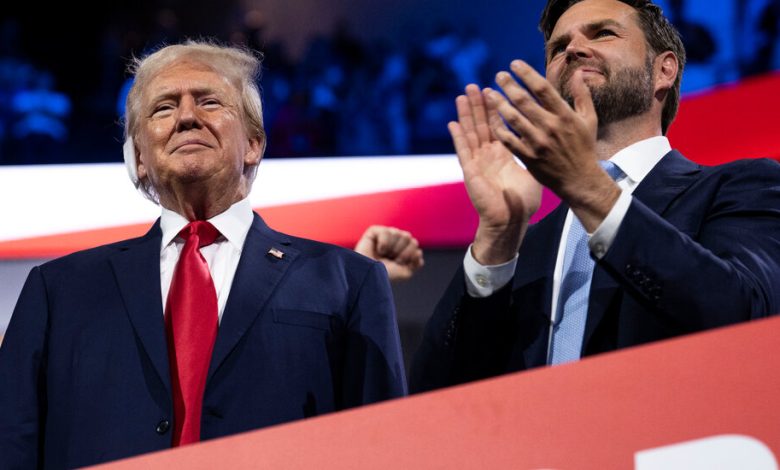How J.D. Vance Seeks to Reorient the Republican’s Approach to Business


Donald Trump chose Senator J.D. Vance of Ohio as his running mate despite Vance’s history of sharp criticism of the former president.Credit…Doug Mills/The New York Times
A new wave Republican
Donald Trump picked J.D. Vance as his running mate and a possible successor to lead the “Make America Great Again” movement.
Much will be made of Vance’s light political résumé — he was elected to the Senate only two years ago. He’s also been scathing about Trump in the past, having called him an “idiot” and himself a “Never Trump guy.” But Vance says he’s a convert, becoming one of Trump’s biggest backers and adopting a similarly populist approach to the economy and business.
Vance’s biography appeals to left-behind voters — and investors. The 39-year-old served in Iraq and later went to Yale Law School, where he met his wife, Usha Vance. (She resigned from her role as a trial lawyer at Munger Tolles & Olson after Vance joined the ticket.) Vance rose to national prominence after publishing the best-selling memoir “Hillbilly Elegy.” He worked at Mithril Capital Management, a venture capital firm co-founded by Peter Thiel, and Steve Case’s Revolution. He also started his own fund with backing from Thiel, Eric Schmidt and Marc Andreessen.
Silicon Valley helped get him on the ticket. Vance is close to the libertarian wing of the tech industry. Thiel gave millions to his Ohio Senate campaign in 2022 and Vance is reportedly close to David Sacks, the venture capitalist who has hosted a Trump fund-raiser at his home and spoke at the Republican National Convention on Monday.
DealBook examined Vance’s links to business, and his views on the economy and industry:
-
Vance has been tough on regulation, and has backed Lina Khan, the F.T.C. chair. Some tech investors celebrated having a former V.C. on the ticket.ButVance has said Big Tech is too powerful and called for Google to be broken up. He’s also backed some of the Biden administration’s efforts to constrain the industry. While many Republicans and business leaders have attacked Khan, Vance has said she is “one of the few people in the Biden administration who I think is doing a pretty good job.”
-
Vance is pro labor. He says the postwar economy has relied too heavily on cheaper labor, a tactic that undercuts wages for American workers and has been exploited by big business. He’s argued that employers’ zeal for cheap labor has helped lead to a surge in unauthorized immigration to the U.S. and that consumers have become addicted to products made in low-wage countries. Those factors have aggravated America’s foreign trade deficit and hit domestic manufacturing, he’s said.
-
Vance isn’t sold on the dollar’s status as the world’s reserve currency. Last year, during an exchange with Jay Powell, the Fed chairman, Vance said dollar dominance was good for Americans’ purchasing power but a “tax on American producers.” Like Trump, he is supportive of crypto and is reportedly working on legislation that would change how the U.S. regulates digital assets.
-
Vance is all in for Big Oil. He has expressed skepticism about the role of humans in causing climate change, and has attacked the Inflation Reduction Act, which provided incentives for the green transitions. Instead, he called for more drilling for shale oil in Ohio.
He’s seen as another Republican who has distanced himself from the pro-globalization wing of the party. “Vance is a leader of the post-financial crisis Republican generation,” Matt Stoller, research director at the American Economic Liberties Project, told DealBook, and is trying to reorient how the party thinks about economic policy.
Yet Vance’s ideological approach, and his positive comments about Khan, worry some in business. “Trump populism and Vance populism are not the same,” one big bank lobbyist told The Financial Times.
-
In other election news: The Democratic National Committee is moving to push President Biden toward the nomination, as he returns to campaigning and reiterated in an interview with NBC News that he wouldn’t withdraw.